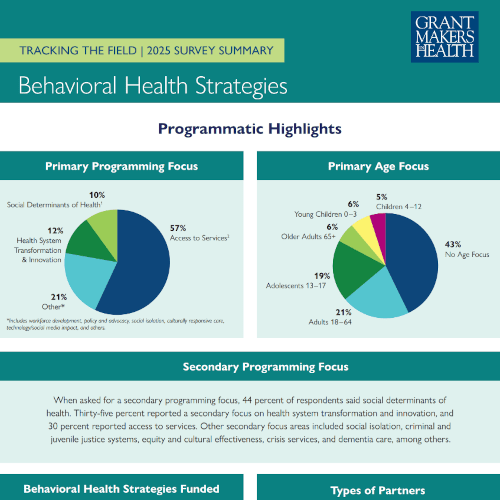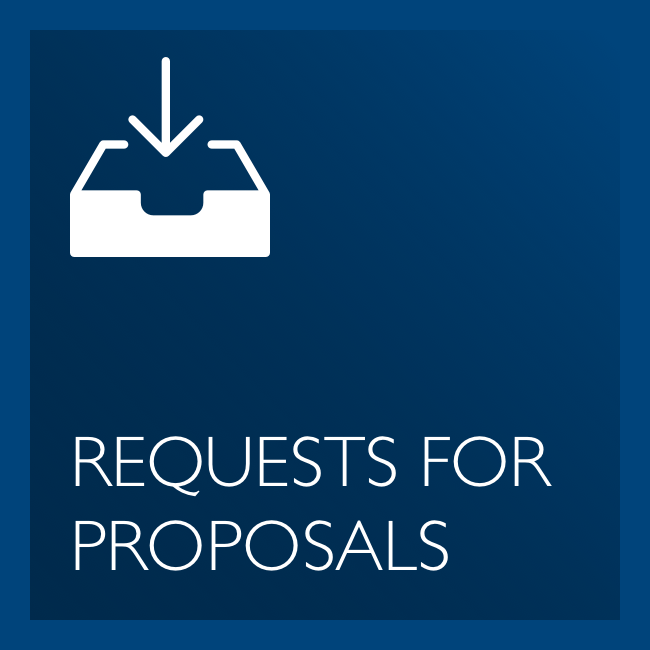Strengthening Maternal Mental Health in Rural Communities
Join us on March 6th, from 2:00 – 3:15 pm ET/ 11:00 am – 12:15 pm PT to explore how maternal mental health is showing up across rural communities, how states are engaging in this new initiative, and where philanthropic strategies can play a meaningful role to advance maternal mental health in rural communities.
The conversation will draw on perspectives from national rural health infrastructure, community-based organizations, and physician-led public health work across rural regions of the country. Speakers will reflect on persistent gaps and promising approaches, and highlight strategies funders can support to strengthen rural delivery systems and promote more accessible, culturally responsive care for mothers and families. The session will conclude with time for funder discussion and questions.
Blue Cross Blue Shield of Massachusetts: October 2025
This new report “Behavioral Health Professional Licensure in Massachusetts: Existing Barriers and Opportunities to Advance Diversity in the Workforce” documents the licensing requirements for behavioral health providers in Massachusetts, describes the barriers to licensure for clinicians from underrepresented populations, and outlines potential solutions.
To Improve Youth Mental Health, Funders Must Center Youth Voices
As youth mental health challenges continue to grow nationwide, a new initiative in Greater Cincinnati believes transformational change begins when youth are empowered to lead.
Behavioral Health in the Balance: Navigating the Impact of the 2025 Budget Reconciliation Act
Medicaid is the single largest payer for behavioral health services and is increasingly responsible for substance use disorder reimbursements. In July 2025, H.R.1 was signed into law containing an estimated $1 trillion in Medicaid cuts over 10 years, resulting in almost 15 million people losing health coverage, according to Congressional Budget Office estimates. The pressure on states to cut spending is immense, and behavioral health services will not be immune. GIH discussed the behavioral health implications of H.R.1 and opportunities for funders to get involved now. Bill Smith and Angela Kimball from Inseparable summarized H.R.1 from a behavioral health perspective. Neel Harja and Sarah Wasil from Michigan Health Endowment Fund and Itai Dinour and Hazel Guzman from Carmel Hill Fund provided examples of how funders are responding to this challenging situation. Funders left the webinar with actionable ideas to protect access to behavioral health services in their states.
Maternal Mental Health and Immigrant and Refugee Women, Parents and Communities
Pregnant and parenting immigrant, migrant, and refugee women are navigating a landscape marked by uncertainty, fear, and systemic exclusion—conditions that profoundly affect their physical and mental health during the perinatal and postpartum periods and throughout their lifespan. Amid increasingly punitive immigration policies, including family separation, detention, and deportation without due process, these women and their families face extraordinary challenges that endanger their mental health and wellbeing and that of their children. Compounding these harms are policy barriers such as the public charge rule, attacks on birthright citizenship, and exclusion from health coverage and other vital services. These stressors contribute to a growing but under-recognized crisis in maternal mental health, with long-term consequences for families and communities.
Georgia Health Initiative: September 2025
A new report, “Progress Towards Vitality: A 10-Year Retrospective Analysis of Systems Focused Efforts to Improve Maternal Health in Georgia,” analyzes a subset of recommendations put forward by the Georgia Maternal Mortality Review Committee (MMRC) and the Georgia House Study Committee on Maternal Mortality to improve maternal mental health in the state.
The Blue Cross Blue Shield of Massachusetts Foundation: July 2025
The Blue Cross Blue Shield of Massachusetts Foundation announced a new grant opportunity: the Advancing Community Driven Mental Health grant program. This program will fund five community-based organizations with grants of up to $100,000 per year for two years, starting in December 2025, to improve and increase access to community based mental health services for adults experiencing mild to moderate mental health distress and practical problems of daily living, and develop the skills of a non-clinical workforce.
Funder Approaches to Addressing the Critical Connection Between Youth Mental Wellness and Financial Wellness
Curious about the connection between mental well-being and financial security during adolescence and young adulthood?
According to the National Alliance on Mental Illness, most mental health conditions are diagnosed during the same life stage when young people are building the skills and accessing opportunities that shape their financial futures. Mental and financial well-being are deeply interconnected—each influences and reinforces the other.
When young people experience mental wellness, they’re better equipped to manage money, handle stress, make informed decisions, and seek help when needed. At the same time, financial security reduces one of the most common sources of stress that can contribute to anxiety, depression, and other mental health challenges. Yet, despite these strong linkages, funders often treat mental health and financial well-being as separate priorities.
How Pew Is Learning to Improve Health Policy
Antibiotics revolutionized medical treatment and are a cornerstone of modern health care. However, the global rise of antibiotic-resistant bacteria is making infections costlier and deadlier. After a 2008 report commissioned by The Pew Charitable Trusts highlighted these concerns, the organization invested in multiple projects to set limits on the use of antibiotics and to spur the development of new drugs.





